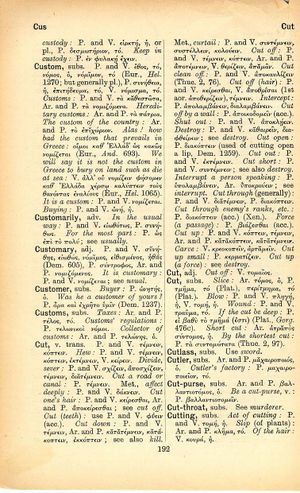cut
τίς ἥδε κραυγὴ καὶ δόμων περίστασις; → what means this uproar and thronging about the house, what means the crowd standing round the house?
English > Greek (Woodhouse)
v. trans.
P. and V. τέμνειν, κόπτειν.
Hew: P. and V. τέμνειν, κόπτειν, ἐκτέμνειν, V. κείρειν.
Divide, sever: P. and V. σχίζειν, ἀποσχίζειν, τέμνειν, διατέμνειν.
Cut a road or canal: P. τέμνειν.
Met., affect deeply: P. and V. δάκνειν.
Cut one's hair: P. and V. κείρεσθαι, Ar. and P. ἀποκείρεσθαι; see cut off.
Out (teeth): use P. and V. φύειν (acc.).
Cut down: P. and V. τέμνειν, Ar. and P. κατατέμνειν, κατακόπτειν, ἐκκόπτειν; see also kill.
Met., curtail: P. and V. συντέμνειν, συστέλλειν, κολούειν.
Cut off: P. and V. τέμνειν, κόπτειν, Ar. and P. ἀποτέμνειν, V. θερίζειν, ἀπαμᾶν.
Cut clean off.: P. and V. ἀποκαυλίζειν (Thuc. 2, 76).
Cut off (hair): P. and V. κείρεσθαι, V. ἀποθρίσαι (1st aor. ἀποθερίζειν), τέμνειν.
Intercept: P. ἀπολαμβάνειν, διαλαμβάνειν.
Cut off by a wall: P. ἀποικοδομεῖν (acc.).
Shut out: P. and V. ἀποκλῄειν.
Destroy: P. and V. καθαιρεῖν, διαφθείρειν; see destroy.
Cut open: P. διακόπτειν (used of cutting open a lip, Dem. 1259).
Cut out: P. and V. ἐκτέμνειν.
Cut short: P. and V. συντέμνειν; see also destroy.
Interrupt a person speaking: P. ὑπολαμβάνειν, Ar. ὑποκρούειν; see interrupt.
Cut through (generally): P. and V. διατέμνειν, P. διακόπτειν.
Cut through enemy's ranks, etc.: P. διακόπτειν (acc.) (Xen.).
Force (a passage): P. βιάζεσθαι (acc.).
Cut up: P. and V. κόπτειν, τέμνειν, Ar. and P. κατακόπτειν, κατατέμνειν.
Carve: V. κρεοκοπεῖν, ἀρταμεῖν.
Cut up small: P. κερματίζειν.
Cut up (a force): see destroy.
adj.
Cut off: V. τομαῖος.
subs.
Slice: Ar. τόμος, ὁ, P. τμῆμα, τό (Plat.), περίτμημα, τό (Plat.).
Blow: P. and V. πληγή, ἡ, V. τομή, ἡ.
Wound: P. and V. τραῦμα, τό.
If the cut be deep: P. εἰ βαθὺ τὸ τμῆμά (ἐστι) (Plat., Gorg. 476C).
Short cut: Ar. ἀτραπός σύντομος, ἡ.
By the shortest cut: P. τὰ συντομώτατα (Thuc. 2, 97).

